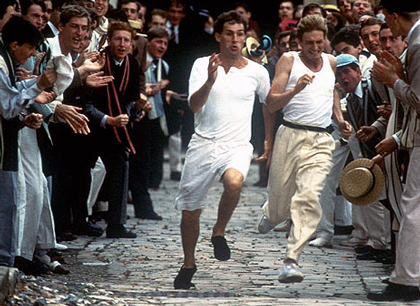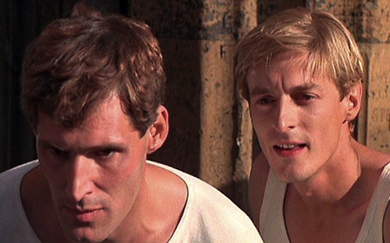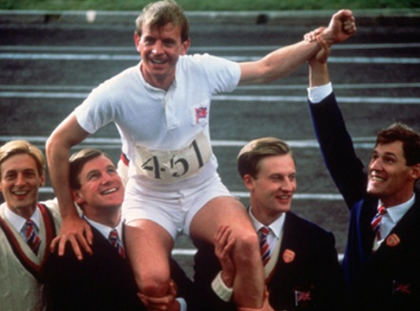
 |
|
|
|
The prime example of the kind of prestige English production that garners top honors every few years at the Academy Awards, Hugh Hudson and David Puttnam's Chariots of Fire has been falsely slammed for being dull and irrelevant. By now, thirty years later, it may be considered to be on the same road to obscurity given Cavalcade, the 1933 Best Picture winner that almost nobody alive has seen. In his book Adventures in the Screen Trade, the persuasive William Goldman buried this film's reputation on the grounds that it wasn't a popcorn movie, and named several other 1981 releases that he thought were far better. 1 It is true that the movie biz seems to pause every few years to give a high-minded English picture a place in the sun: The Queen, The King's Speech, etc. But no film should be judged that narrowly. Chariots of Fire did well because audiences pulled in by the sports theme and Vangelis' top-ten title instrumental liked its celebration of sportsmanship and fair play. Writer Colin Welland's portrait of non-mainstream athletes navigating the strictures of an intolerant English society has enough fascinating detail to impress us, without exaggeration. 
The movie begins in 1978 but flashes back to several moments in time before settling in on 1924, the year of the Paris Olympics. At the fancy Caius College, students Aubrey Montague and Lord Andrew Lindsay (Nicholas Farrell & Nigel Havers) become fast friends with Harold Abrahams (Ben Cross), a multi-talented and aggressively competitive Jewish colleague who wins a traditional school footrace challenge not claimed in 700 years. In Scotland, devout missionary Eric Liddell (Ian Charleson) is considered one of the fastest foot racers in the world, "The Flying Scotsman". He has a tough time convincing his demanding, loving sister Jennie (Cheryl Campbell of Dennis Potter's Pennies from Heaven) that his ambition to race in the Olympics does not conflict with his chosen vocation as a missionary in China. As the '24 Olympics approaches, Harold is embittered by the cold attitude of his school's Masters (John Gielgud & Lindsay Anderson). He finds a sense of humor about his racing through the company of musical star Sybil Gordon (Alice Krige), who repeatedly tells him, "nobody cares if he's a Jew." Concerned about his performance on the track, Harold secretly hires pro trainer Sam Mussabini (Ian Holm), who quietly coaches him to improve his stride, to "give him two extra yards" on the track field. In Paris, it is Eric Liddell who faces the most crucial challenge. A preliminary race for his main event is to be run on a Sunday, and his conscience forbids him to race on the Sabbath. Lord Birkenhead (Nigel Davenport) intercedes, but even the Prince of Wales (David Yelland) cannot persuade Eric to yield. Will he come all this way, and not be able to compete? Chariots of Fire builds in strength as it moves along. Without a hint of cynicism, we meet some refreshing young men who want what all idealistic young men desire -- to achieve, to conquer, to realize their potential. The movie indulges in a lot of speechifying, most of which is good. Only in the second half does some of the dialogue get a little thick, when people redundantly express the author's messages out loud. But there's not enough of this to do any harm. Audiences were also charmed by the film's bright-faced young men; Chariots of Fire can be seen as a conservative rebuttal to the rebellious youth of 1981. Some of the heroes of the 1924 served in the military but most were too young to have spent their life's energy in the trenches. The tragic Gallipolli tells the story of a similar, but less advantaged, Olympic hopeful just a few years older than the men seen here. 
Hugh Hudson has the virtue of old-school filmmakers that chose their shots well and avoided ostentatious effects. Editor Terry Rawlings fashions miles of over-cranked slow-mo race footage into some attractive track & field montages, without trying to make the film into a visual work of art. The races convince us that these actors might actually be very fast athletes, something that rarely works in sports films. The show also sells its non-star leads Ben Cross and Ian Charleson as great figures -- I remember being impressed by their on-screen presence and thinking that I should know their names. So many years later it's easy to pick up on the specialness of many cast members, like Dennis Christopher (Breaking Away) and director Lindsay Anderson. I didn't even recognize Nigel Davenport even though he stars in several of my favorite movies. Something about his hairline still throws me. Seeing Chariots of Fire today, I searched to find out why Ian Charleson didn't become a household name. The sad fact is that, like supporting player Brad Davis, Charleson became a victim of AIDS only a few years later. Is the show overly idealized? I don't think so. These young princes of post-war England may be outsiders but it's difficult to call them underdogs. The Liddells are the most prosperous-looking missionary family I've ever seen, while the headstrong Harold Abrahams cannot list an economic disadvantage among his resentments. Chariots of Fire is about honor and idealism, not social inequity. To its credit, it is not ignorant of the problem. The exalted status of its heroes is put in perspective (or dispensed with?) in the very first scene, when we see two porters, obviously wounded in the war, carrying their bags. The use of the hymn "Jerusalem" near the finish also recalls the very different Tony Richardson movie The Loneliness of the Long Distance Runner. The hymn is used for ironic effect in a story of a rebellious Borstal boy competing with posh Public School racers. One thing in the movie surprised me: I thought it was preparing to make a much larger issue of anti-Semitism, by disqualifying Harold Abrahams before the race or having the committee pull his medal afterwards, as happened to the unfortunate Jim Thorpe. The setup is there when Gielgud and Anderson question Abrahams' amateur status back at Caius College, and spelled out when Ian Holm's pro trainer hides out at the Olympics, presumably so Harold's amateur status won't be challenged. This issue only comes up because the film doesn't dramatize all the conflicts that it acknowledges. Surely athletes require coaches and trainers, who must be paid and therefore are professionals... or was that not the case with the Olympics of 1924? Chariots of Fire doesn't really show any training outside of Harold's personal situation. The suspicion is that Harold Abrahams is gaming the system, as if using Sam Mussabini is like taking steroids. The "outsider" Harold's defensive stance comes off as selfish while Lindsay appears to be a prince of princes. In contrast, the Ruling Class is given a shining example in Lord Andrew Lindsay, who makes a gallant personal sacrifice to clear the obstacle to Eric Liddell's participation in the games. Eric is spared from choosing between his God and his Country -- thanks to the intervention of a noble gesture. 
Audiences loved Chariots of Fire. Producer Puttnam works a lot of variety into the show, staging a scene from The Mikado and filling the screen with huge crowd scenes. It's impossible not to be impressed by this, as newer pictures like The King's Speech play out on a comparatively tiny canvas. I don't know what people will now think of Vangelis' immensely popular music, which cemented the vogue for electronic film scores. The main theme does fit the opening shot well, even if it sounds like elevator music. Back when it played non-stop on every radio station in the country I was ready to shoot myself, and that ill will spilled over onto the film. I'm no longer so offended. Warner Home Video's Blu-ray of Chariots of Fire is part of their book-packaged line of quiet special editions. David Watkins' glowing cinematography comes off very well, certainly better than the fuzzy prints that once showed on cable television. The movie was a multiple Oscar winner and as such is perhaps treated with a little too much solemnity. An interview with Hugh Hudson is identified as new, as are two documentaries, Paris 1924: Birth of the Modern Games and David Puttnam, A Cinematic Champion. Hudson's commentary is here, along with two other featurettes, a Making-Of piece and a reunion of surviving actors and filmmakers. Also included is a fat list of deleted scenes and some screen tests. The souvenir booklet offers interesting facts and some nice character portraits, but also a rather thick P.R. message. The movie is at one point called "the greatest sports film in history." A second CD disc is an audio sampler with four themes from the Vangelis score, which beat out John Williams' Raiders of the Lost Ark at the Oscars. I told you it was popular.
On a scale of Excellent, Good, Fair, and Poor,
Chariots of Fire Blu-ray rates:
Footnote:
1. Confounding the issue (but making a convincing argument), William Goldman named a reissue of Bambi as the year's movie that "took his head off." Some old-fashioned ideas are better than others.
Reviews on the Savant main site have additional credits information and are often updated and annotated with reader input and graphics. Also, don't forget the 2011 Savant Wish List. T'was Ever Thus.
Review Staff | About DVD Talk | Newsletter Subscribe | Join DVD Talk Forum |
| ||||||||||||||||||